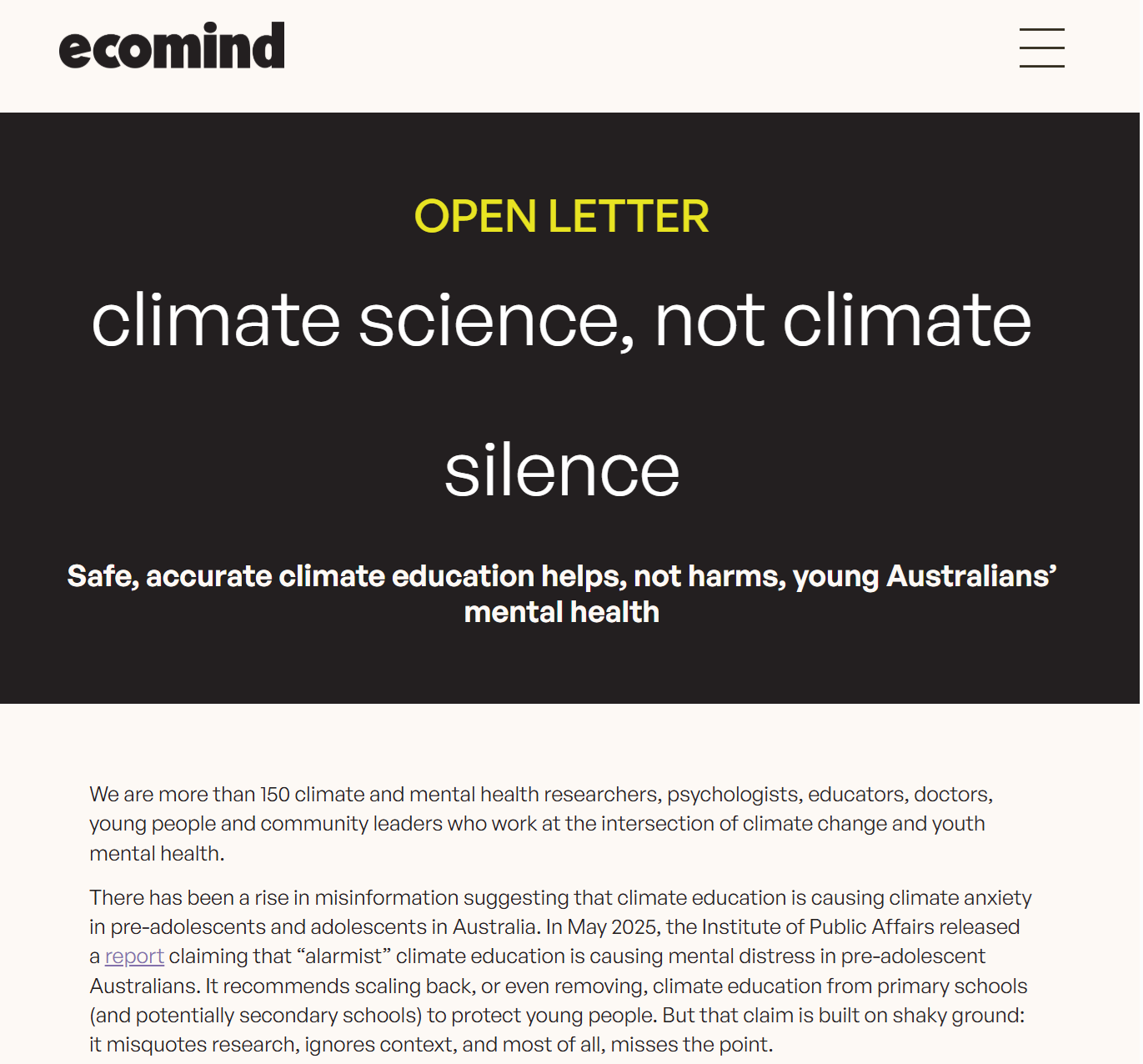Over the past two decades, there has been an explosion in instances of climate anxiety, especially among young people, which refers to the chronic fear of environmental doom from the perceived impact of climate change.
Climate anxiety overwhelmingly comes from alarmist messaging rather than the actual experience of climate change.
In a report entitled Climate Anxiety in Pre-adolescent Children, developmental psychologist and Institute of Public Affairs Adjunct Fellow, Clare Rowe, warns alarmist climate messaging risks children developing chronic stress, experiencing reduced psychological wellbeing, and developing a sense of helplessness.
Rowe’s report has been overwhelmingly well-received because it brings to light an important issue that parents and many educators hitherto knew little about. However, not everyone is happy; not least Ecomind, a charity purportedly concerned with young people’s mental health in the face of hysterical climate change education.
In response, Ecomind cobbled together a coalition of physicians, climate researchers, and so-called ‘community leaders’, to write an open letter pushing back against the call to stop propaganda scaring children with alarmist climate messaging in schools. They wrote:
[Climate] anxiety is not irrational, but a valid emotional response to a very real crisis … young Australians are already experiencing more frequent and severe droughts, flooding rains and other extreme weather events … they’ve seen homes destroyed, species lost, food prices soar, and political leaders delay critical decisions.
Ecomind’s cohort argue that climate anxiety is not due to the activist propaganda in schools but rather is developed from personal experience. Of course, this is contradicted by a body of peer-reviewed academic research.

The results are clear: climate anxiety is much more closely linked to exposure to alarmist messaging than actually experiencing the impact of natural disasters.
A 2022 study by Ogunbode et al, published in the Journal of Environmental Psychology, tested whether prior lived experience with flooding can give rise to climate anxiety. It concluded: ‘Prior flooding experience did not predict climate anxiety.’ Rather, the researchers found that climate anxiety is related to the nature of information people receive rather than any experience through which they live – which explains why climate anxiety tends to strongly feature in ‘individualistic and wealthier countries’.
Worries about climate change are more prevalent in the United Kingdom and Finland compared to, say, Oman and China, even though the former – according to the University of Notre Dame’s Global Adaptation Initiative – are far more prepared and less vulnerable to the supposed impacts of climate change. It is also worthwhile noting that China was responsible for 31 per cent of the world’s annual carbon dioxide emissions in 2023, compared to Finland’s 0.1 per cent and the United Kingdom’s 0.93 per cent.
A Norwegian study, published in 2020 in the journal Climatic Change, suggests that exposure to just one Intergovernmental Panel on Climate Change’s report on global warming is enough to result in ‘increased climate change concern’.
A further study from the United States, by Zanocco et al, in Climatic Change, suggests that the way in which elite-framing is done by authority figures contributes to a person’s likelihood to associate extreme weather events with climate change.
A more recent study of adolescent children in China, published in BMC Public Health, found there is a bidirectional relationship between what researchers term ‘climate change awareness’ and anxiety among adolescent children. This suggests alarmist climate narratives and climate anxiety in children form a vicious circle, whereby the more anxious a child is, the more exposure they tend to get to anxiety-inducing climate claims.
The way to stop this vicious circle is by teaching children the fundamentals needed to assess the information which gives rise to such anxiety in the first place. Schools bear primary responsibility to equip children with the necessary skills – by teaching them about statistical probabilities, interactions between electromagnetic radiations and atmospheric substances, and the differences between hyperbole and factual information.
Genuine commitment to science requires openness to scientific debate. And for children to be able to engage meaningfully in it, they need real foundational skills like quantitative analysis and complex scientific reasoning.
Every classroom minute spent terrorising children with claims about a climate apocalypse is a minute that could have been spent on actual science.
Colleen Harkin is the Director of the Institute of Public Affairs’ Schools Program, and Dr Kevin You is a Senior Fellow at the Institute of Public Affairs

























